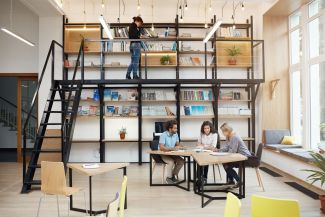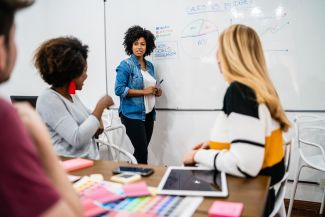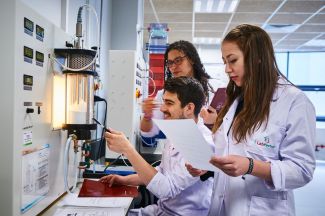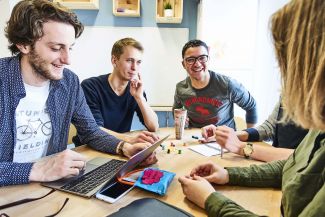The high quality of education offered by Lodz University of Technology is a guarantee of the quality of the diploma for our students, which is appreciated by Polish and foreign employers.
Together with the changing needs of the external environment, the university continues to improve its educational system. Lodz University of Technology makes sure that students encounter real problems of companies and business during their studies. This is achieved through internships in Poland and abroad, study visits, open days for companies, lectures and classes conducted with future employers. We want students of all faculties to know from the beginning which industries they will find themselves in in the future. We focus on improving soft skills: communication, creativity, initiative, flexibility, group cooperation or time management.
We use modern methods and techniques in teaching and gaining knowledge:
Problem Based Learning
This method is used when solving a real problem that has been reported by a socio-economic entity, entrepreneur, employee. It consists in preparing a solution based on the knowledge gained during the work of team members. The ability to share information in a group is extremely important. This allows you to expand your knowledge and develop teamwork skills at the same time.
The teacher is only a mentor, supporting the group in the learning process. His or her role is to give a substantive "feedback", which reassures the students about the validity of their own opinions. Thanks to the PBL method students will be able to easily take up new challenges and implement innovative projects.
Students work in groups of 4-5 people and the results, conclusions and research results are discussed during a public presentation. The assessment
of the work and the degree of involvement in particular issues is performed by both the tutor and the other students from a given project group.
Flipped education
A method based on a new learning culture. The innovation is to change the order of tasks during classes - homework is the first stage during which students prepare for classes.
The knowledge gained in this way allows for an effective exchange of information during classes at the university. Flipped education also changes the classic roles of teachers and students.
Design thinking
It is a method of creating innovative projects, products and services based on a deep understanding of problems and user needs. The work of interdisciplinary teams gives an opportunity to look at the problem from different perspectives.
Design Thinking, through its universal character, is applicable wherever we are dealing with problems that do not have an obvious solution or rigid framework of so-called "wicked problems".
The method of Design Thinking assumes that there are no completely bad ideas, even the less successful ones can become an inspiration for creating new solutions.
Case teaching
Using this method, students analyze a real-world situation (a case) that creates a problem or dilemma that provokes them to think.
Students gain influence on how the problem is solved and the real nature of the cases to be developed increases their involvement. They apply the theory in practice.
The task is to organize and analyze the data and propose an optimal solution, taking into account different perspectives. Additionally, teamwork allows to acquire new competences.
Blended learning
Combining traditional university teaching with remote communication. Depending on the program of particular classes, the participation of particular educational techniques is selected.
A significant part of classes in all fields of study is carried out through the Wikamp platform (virtual campus) based on remote learning environment, using Moodle ICT networks.
The Wikamp platform includes websites which focus a number of services in one place, including information for students, e-mail, educational materials.
Tutoring
The aim of the tutoring is to develop the student's academic, social and personal competences.
It is an organized and individualized work, especially with outstanding but also struggling students. In this type of classes the student's personal experience and skills are taken into account.
Thanks to cooperation responding to individual needs, the student can develop effectively, achieving specific goals.
Using this method the student learns: independent, critical thinking, searching for sources, creating essays, presenting his views, discipline and perseverance, communicating with the master, participating in academic culture, social life, etc.






